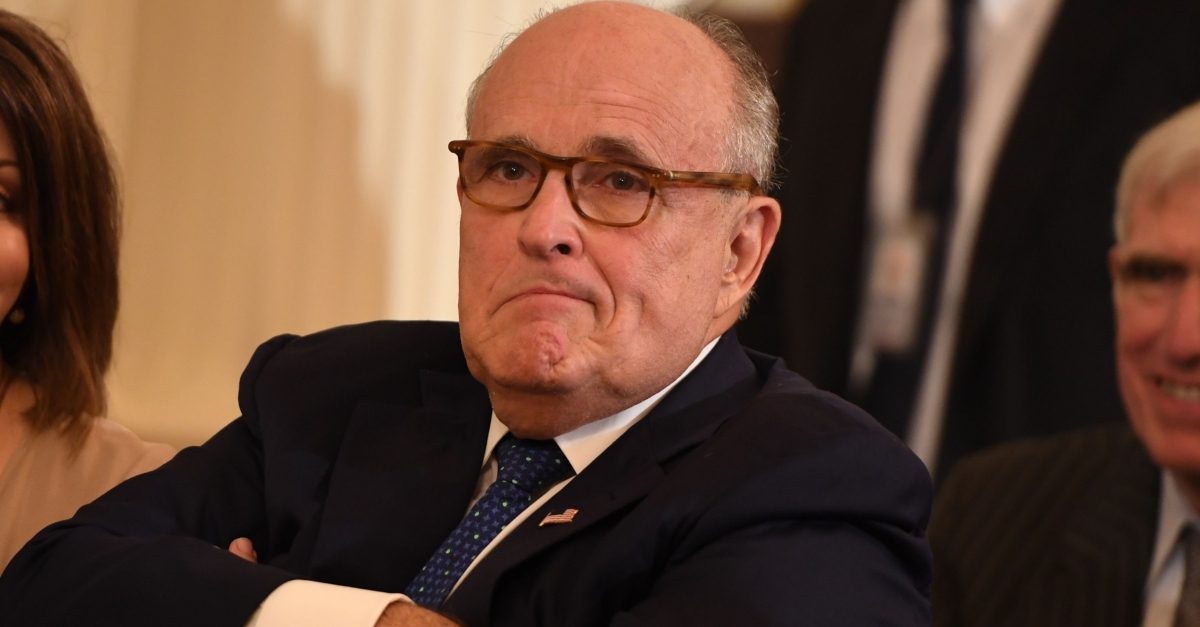
Federal authorities looking into the foreign dealings of Rudy Giuliani on Wednesday escalated their investigation into the former New York City mayor, executing a search warrant on his Manhattan apartment and seizing several of his electronic devices. Legal experts and former Justice Department attorneys were quick to weigh in on the latest development, with many indicating that Donald Trump’s onetime personal attorney has a problem on his hands.
According to the New York Times report, the investigation stems from Giuliani’s business dealings in Ukraine that placed him at the center of systematic efforts to oust former U.S. Ambassador to Ukraine Marie Yovanovitch. While authorities began the probe in late 2019, the U.S. Attorney’s Office in Manhattan had reportedly sought to execute such a warrant on Giuliani, only to be thwarted by “senior political appointees in the Justice Department,” sources told the Times.
Giuliani’s attorney Robert J. Costello called the searches “legal thuggery,” saying that his client had been willing to answer questions about all of his non-privileged communications Trump.
Costello also responded to the raid by saying that the feds are in thrall to “Trump Derangement Syndrome.”
Attorney-client privilege may be a major sticking point in how authorities handle whatever evidence may be on Giuliani’s newly-seized electronics. In the case of Trump’s former attorney Michael Cohen, U.S. District Judge Kimba Wood appointed former judge Barbara Jones as a special master, tasked with determining which of the seized Cohen documents were subject to the attorney-client privilege.
CNN legal analyst Jennifer Rodgers, who spent more than a decade as a prosecutor in the Southern District of New York (SDNY), told Law&Crime that the crime-fraud exception will likely help the DOJ overcome some of those privilege protections as well.
“Rudy was not [Trump’s] lawyer for as long and didn’t work for him as the same scope with the Trump Organization or even in government, but in some ways was unquestionably providing him legal advice,” Rodgers noted. “So, you’re certainly going to have privilege issues. Now, the ways in which Rudy unquestionably acted as his lawyer, like when he was representing him in connection with the Mueller investigation, are presumably not the subject of this inquiry. So, you could argue that what he was doing in connection with Ukraine was not legal advice. And that’s going to be an obviously a key issue here.”
That notion was bolstered by Ross Garber, an attorney who specializes in impeachment and political investigations.
“This Rudy development is going to raise huge attorney-client privilege issues,” he tweeted. “Not all communications with someone who went to law school are privileged. Only those between lawyer and client in furtherance of legal advice.”
Former U.S. Attorney Harry Litman, who teaches constitutional law and is a legal columnist for the Los Angeles Times, noted that it was very likely the DOJ had already undergone a thorough vetting process before executing a search warrant on a high-profile and well-connected lawyer like Giuliani.
“Oh my — Giuliani’s apartment searched based on his nasty doings in Ukraine, which were plainly dishonest and based on wild lies — but this means that a magistrate judge has found probable cause to believe that they were also criminal. very major development,” he tweeted. “Put otherwise –I don’t know offhand the percentage of people whose apt are searched by warrant who are then indicted–what do my other ex-feds say to that?–but it’s high, and given Giuliani’s profile, it has to be higher [because] they would be more careful and get lots of approvals.”
Adding that Wednesday’s developments were a “truly extraordinary step,” Litman said potential charges included “lobbying violations, possible bribes, and general fraud.”
Several other former federal prosecutors had a similar take, believing the DOJ wouldn’t have moved against Giuliani unless there was already a very solid evidentiary foundation in place.
“Anyway as the article suggests searching a lawyer is a Big Deal requiring high-level approval and strongly supports the notion that the Rudy investigation is real and advanced rather than speculative,” wrote former federal prosecutor Ken White.
Renato Mariotti, also a former federal prosecutor, laid out the federal warrant process in more detail.
“To obtain a search warrant, federal law enforcement had to present evidence to a federal judge sufficient for that judge to conclude that there is good reason to believe: 1) A federal crime was committed 2) Evidence of that crime is in Rudy’s apartment and electronic devices,” he wrote. “A ‘good reason to believe’ is called ‘probable cause’ and it’s a lower standard than 51% or proof beyond a reasonable doubt. But it’s not good enough for law enforcement to have a hunch. A judge is going to require something substantial to approve these warrants.”
Speaking about the difficulties in investigating a licensed attorney, Mariotti said “those complexities are heightened when the lawyer is a criminal defense attorney because DOJ does not want to appear to be targeting opponents.”
“That means that these warrants were not just approved by a federal judge, but that they were reviewed by high-level Justice Department officials. That suggests to me that DOJ is convinced they have significant evidence and that these searches will likely bear fruit,” he added.
Others, like attorney and Trump critic George Conway, basked in the schadenfreude of Giuliani’s predicament.
“[You] are in deep, deep s**t,” he tweeted, piggybacking off of an old Giuliani tweet that just read “You.”
Giuliani’s apparently planned radio statement on the day’s events did not occur.
[image via Saul Loeb/AFP/Getty Images]